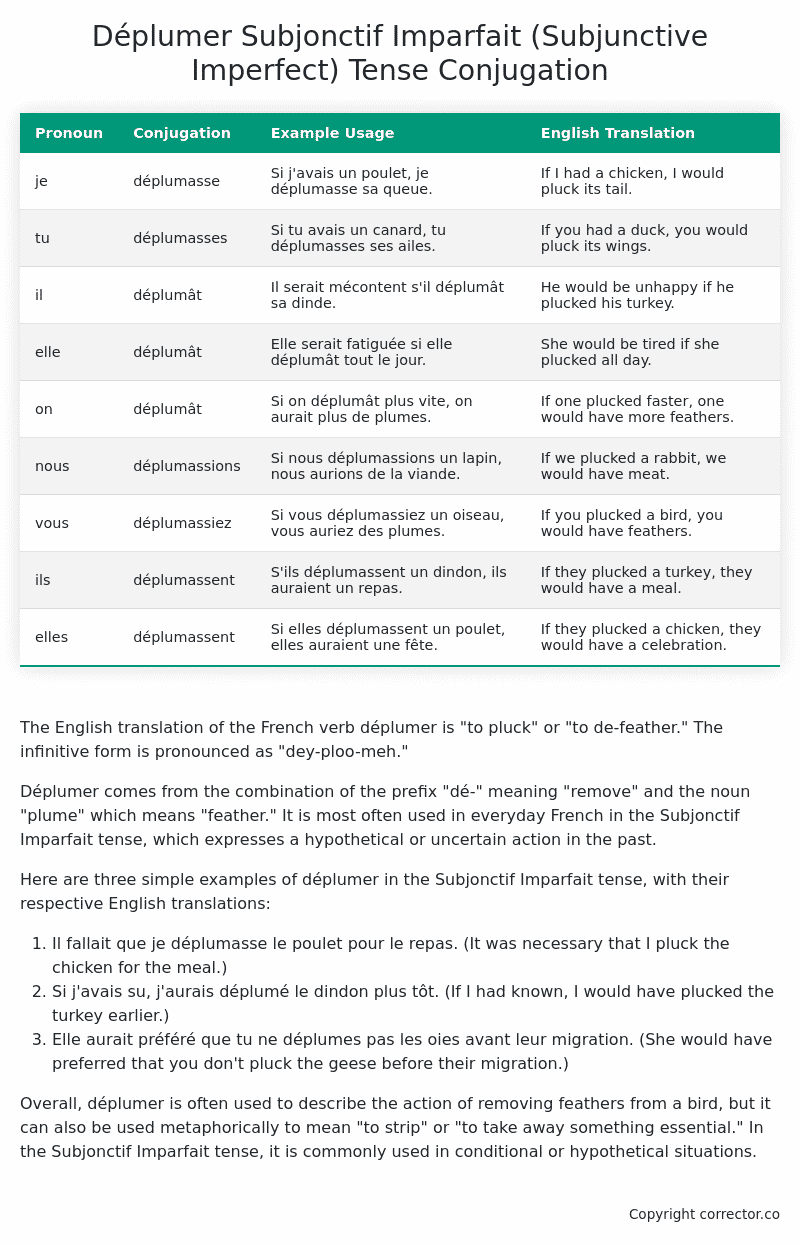Subjonctif Imparfait (Subjunctive Imperfect) Tense Conjugation of the French Verb déplumer
Introduction to the verb déplumer
The English translation of the French verb déplumer is “to pluck” or “to de-feather.” The infinitive form is pronounced as “dey-ploo-meh.”
Déplumer comes from the combination of the prefix “dé-” meaning “remove” and the noun “plume” which means “feather.” It is most often used in everyday French in the Subjonctif Imparfait tense, which expresses a hypothetical or uncertain action in the past.
Here are three simple examples of déplumer in the Subjonctif Imparfait tense, with their respective English translations:
- Il fallait que je déplumasse le poulet pour le repas. (It was necessary that I pluck the chicken for the meal.)
- Si j’avais su, j’aurais déplumé le dindon plus tôt. (If I had known, I would have plucked the turkey earlier.)
- Elle aurait préféré que tu ne déplumes pas les oies avant leur migration. (She would have preferred that you don’t pluck the geese before their migration.)
Overall, déplumer is often used to describe the action of removing feathers from a bird, but it can also be used metaphorically to mean “to strip” or “to take away something essential.” In the Subjonctif Imparfait tense, it is commonly used in conditional or hypothetical situations.
Table of the Subjonctif Imparfait (Subjunctive Imperfect) Tense Conjugation of déplumer
| Pronoun | Conjugation | Example Usage | English Translation |
|---|---|---|---|
| je | déplumasse | Si j’avais un poulet, je déplumasse sa queue. | If I had a chicken, I would pluck its tail. |
| tu | déplumasses | Si tu avais un canard, tu déplumasses ses ailes. | If you had a duck, you would pluck its wings. |
| il | déplumât | Il serait mécontent s’il déplumât sa dinde. | He would be unhappy if he plucked his turkey. |
| elle | déplumât | Elle serait fatiguée si elle déplumât tout le jour. | She would be tired if she plucked all day. |
| on | déplumât | Si on déplumât plus vite, on aurait plus de plumes. | If one plucked faster, one would have more feathers. |
| nous | déplumassions | Si nous déplumassions un lapin, nous aurions de la viande. | If we plucked a rabbit, we would have meat. |
| vous | déplumassiez | Si vous déplumassiez un oiseau, vous auriez des plumes. | If you plucked a bird, you would have feathers. |
| ils | déplumassent | S’ils déplumassent un dindon, ils auraient un repas. | If they plucked a turkey, they would have a meal. |
| elles | déplumassent | Si elles déplumassent un poulet, elles auraient une fête. | If they plucked a chicken, they would have a celebration. |
Other Conjugations for Déplumer.
Le Present (Present Tense) Conjugation of the French Verb déplumer
Imparfait (Imperfect) Tense Conjugation of the French Verb déplumer
Passé Simple (Simple Past) Tense Conjugation of the French Verb déplumer
Passé Composé (Present Perfect) Tense Conjugation of the French Verb déplumer
Futur Simple (Simple Future) Tense Conjugation of the French Verb déplumer
Futur Proche (Near Future) Tense Conjugation of the French Verb déplumer
Plus-que-parfait (Pluperfect) Tense Conjugation of the French Verb déplumer
Passé Antérieur (Past Anterior) Tense Conjugation of the French Verb déplumer
Futur Antérieur (Future Anterior) Tense Conjugation of the French Verb déplumer
Subjonctif Présent (Subjunctive Present) Tense Conjugation of the French Verb déplumer
Subjonctif Passé (Subjunctive Past) Tense Conjugation of the French Verb déplumer
Subjonctif Imparfait (Subjunctive Imperfect) Tense Conjugation of the French Verb déplumer (this article)
Subjonctif Plus-que-parfait (Subjunctive Pluperfect) Tense Conjugation of the French Verb déplumer
Conditionnel Présent (Conditional Present) Tense Conjugation of the French Verb déplumer
Conditionnel Passé (Conditional Past) Tense Conjugation of the French Verb déplumer
L’impératif Présent (Imperative Present) Tense Conjugation of the French Verb déplumer
L’infinitif Présent (Infinitive Present) Tense Conjugation of the French Verb déplumer
Struggling with French verbs or the language in general? Why not use our free French Grammar Checker – no registration required!
Get a FREE Download Study Sheet of this Conjugation 🔥
Simply right click the image below, click “save image” and get your free reference for the déplumer Subjonctif Imparfait tense conjugation!

Déplumer – About the French Subjonctif Imparfait (Subjunctive Imperfect) Tense
Formation
Common Everyday Usage Patterns
Interactions with Other Tenses
Subjonctif Présent
Indicatif Passé Composé
Conditional
Conditional Perfect
Summary
I hope you enjoyed this article on the verb déplumer. Still in a learning mood? Check out another TOTALLY random French verb conjugation!


